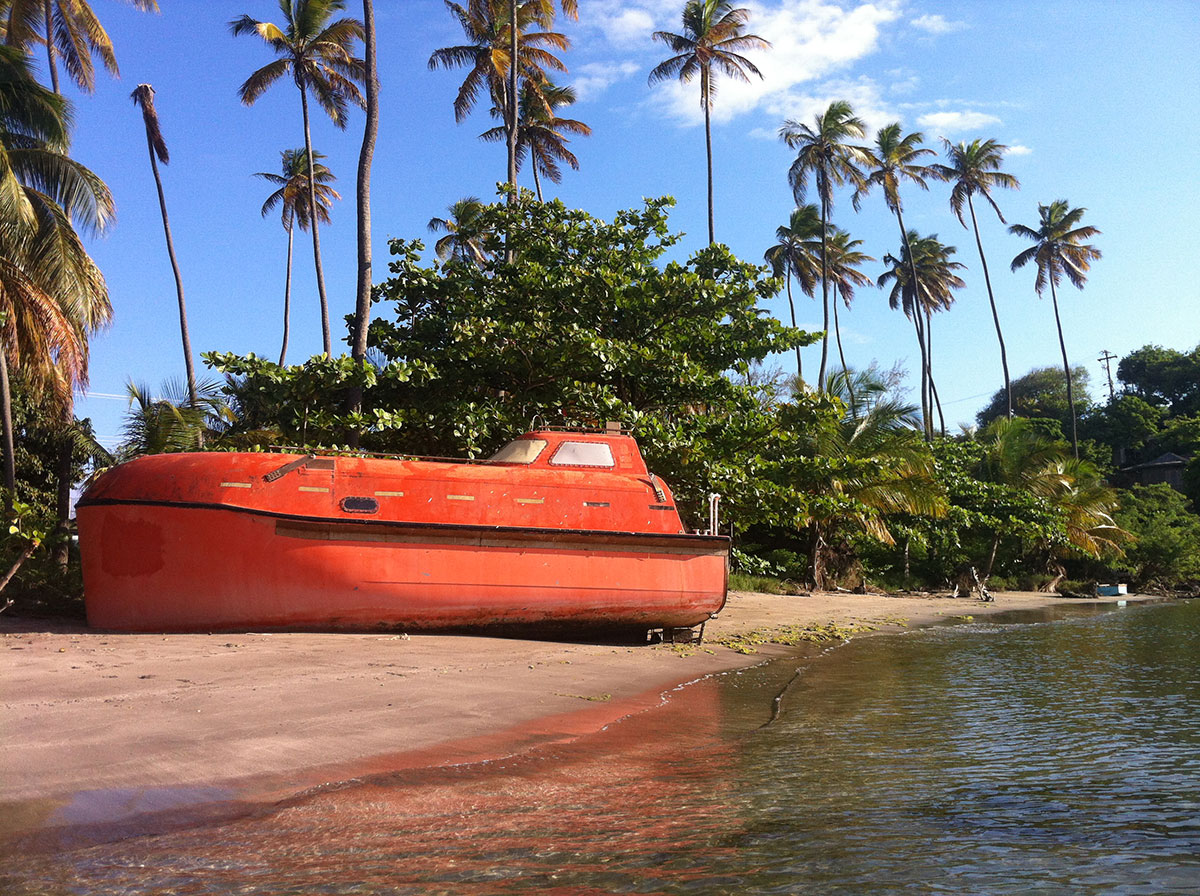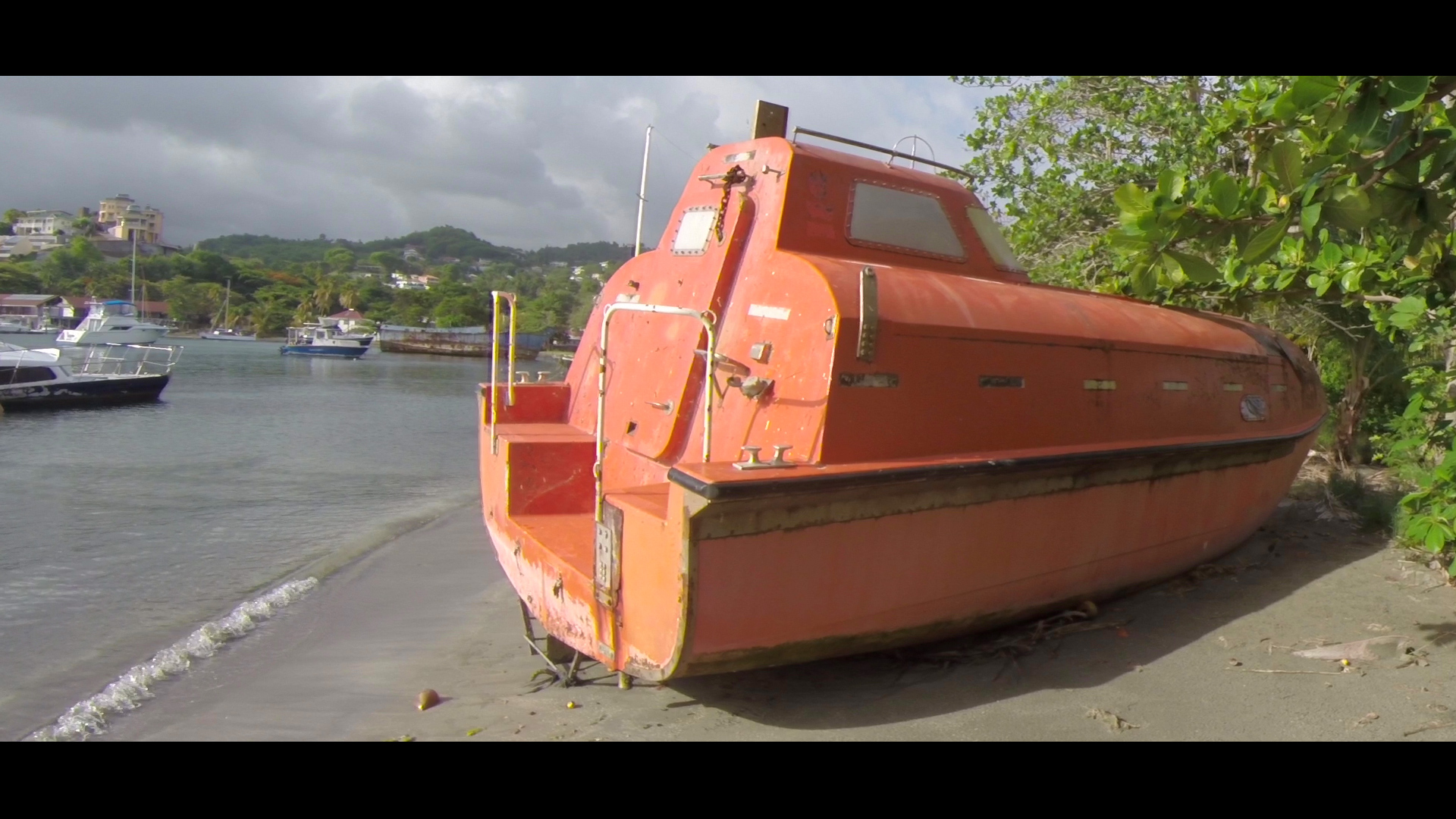Coffee...
Reveals a Coaster...
...and the other side of the coaster. Found at the National Emergency Management Organization (NEMO) headquarters.
Herman Belmar & Coast Guard CPO Doninique Stowe at CDEMA workshop. - Video Still
Monday
We were invited to attend, participate, and interview attendees at the “Mainstreaming Climate Change in Disaster Management in the Caribbean” workshop hosted by the National Emergency Management Organization (NEMO), and organized by the Caribbean Disaster Emergency Management Agency (CDEMA), as part of a broader regional project, funded through the Austrian Development Cooperation. CDEMA is now in the second phase of the project, the purpose of which is to further enhance the resilience of the 18 Participating States by strengthening regional, national and community level capacity in response to the effects of climate change. This second phase is designed to “climate smart” National Disaster Management Work Programs.
The work program is designed around the principles of participation and gender equality. Throughout the two days, the program stressed the importance of having the “climate smarting” process grounded in local participation and that "climate smarting" mitigate the gender disparities of natural and technological disasters.
Bernard Marksman - Director General of the Red Cross, SVG - Video Still
The other main theme of the workshop was cross-sector collaboration, which was evident in the large number of sectors represented at the workshop. In attendance were representatives from the Ministries of Tourism, Health, Wellness and the Environment, Transport, Agriculture and Fisheries, National Parks, and Transportation. There was also representation from Community Organizations in Bequia and the National Coordinator for the United Nations Development Program (UNDP) Global Environment Facility (GEF) Small Grants Program.
- Nuin-Tara
Coral, Bequia - Video Still
Coral Bleaching
Temperature of oceans are rising too drastically for coral reefs to adapt to the hostile conditions, leading to a phenomenon called coral bleaching. As the the water temperature rises, the reef is put under significant stress - this causes the coral to expel the symbiotic algae living within the reef itself. Without this algae, the reef is more vulnerable to disease or predators, and often leads to widespread coral death.
Near Georgetown, St Vincent - Video Still
Sea Level Rise
Nearly 90% of the population of St Vincent and the Grenadines lives within 5 kilometers of the coast; a similar proportion of the country’s infrastructure is located in the same beach zone. With projected sea level rise of 3 feet or more in the next century or so, such communities would be directly threatened by this rise. On other Caribbean islands, in addition to these direct results of rising sea levels, there is potential for salt water invasion in groundwater reserves. Though St Vincent has no source of groundwater, other Caribbean islands have underground aquifers which, as sea levels rise higher, could become susceptible to contamination by encroaching salt water, effectively removing access to fresh water from the majority of the population of an island.
Storm Frequency/Severity
Over the past decades, the average power and frequency of hurricanes in the Caribbean has been monitored, and the data has shown a gradual increase in both frequency and power of the storms. Data collected over the past 50 years shows that there is a high correlation between average surface temperature in the Atlantic Ocean and severity and frequency of tropical storms, with higher temperatures leading to more storms, and worse ones.
- Shale
Some snippets of rainy Kingstown.
Wednesday
It rained a lot today - but hardest, it seemed, when we were hoofing it across town between interviews. Among those in wednesday's interviewees was Mr. Hayden Billingy from GEF-SGP (Global Environment Facility – Small Grants Programme). Mr. Billingy spoke at length about the various programs his organization funds, and helped us connect with an organization in Owea, in the north of St. Vincent, where we have now added another low-cost film workshop.
Thursday
Our second round of site visits took us to the two remaining rainwater harvesting demonstration projects. These included Richland Park Government School and Park Hill Primary School on the Windward (east) side of the Island. These sites, unlike the ones we visited last week, are located slightly more inland, tucked in the dramatic agricultural district of Mesopotamia.
The landscape surrounding these sites was lush with terraced farms growing an abundance of local root crops and fruit, including dasheen, cassava, bananas and mangos, and even some peanuts. Avocados and breadfruit, pomcite and wax apples – at every turn there was another delicious food.
Chalk boards, Park Hill School - Video Still
Park Hill School - Video Still
Since School is out for the summer (or rainy season as they say here, since it is always summer on the islands), the school was quiet, but we could easily imagine the yard full of kids and the classrooms bustling with noise and activity.
The rainwater harvesting tank at Richland park was originally slated to be installed to the side of the schoolyard, but since this would require the removal of the only two shade trees in the yard, the project team worked to place the tanks and base on the back side of the school. While this tank system will also hold 10,000 gallons, two 5,000-gallon PVC tanks will be installed, rather than the concrete and steel tanks we saw last week. All of the sites were originally slated to include PVC tanks, but due to issues with getting them through customs, free of the Value Added Tax (VAT) of 15% and some issues with transporting the tanks up some of the winding and narrow roads, four of the six sites have been modified to accommodate concrete tanks (a hint at the unforeseen challenges and hiccups that can necessitate flexibility in project planning and implementation).
Montage by Annie Von Burg
The rainwater harvesting tanks at Park Hill are of the same design as Richland Park – two 5,000-gallon PVC tanks, sitting on a reinforced concrete and steel bed. Like all the other sites, these tanks will not only provide water for bathing and sanitary uses when the schools are used as emergency shelters, but they will also provide a back-up water system for the students, in times of water outages due to disruptions in service from line breakages or repairs, and water rationing in times of drought.
Chicken and Bake - Video Still
After leaving the last of the six rainwater harvesting demonstration project sites, we took a short detour at the bottom of the hill for some fried chicken, bake (which are actually fried roles) and an assortment of desserts, including a candied coconut roll (think cinnamon roll, but with candied coconut in place of nuts, sugar and spices), coconut drops (a dense coconut sweet roll), and some bread pudding with essence (see our blog post from 7/20 to hear all about essence from our neighbor Marlin).
This was a wonderful conclusion to our site visits on the mainland of Saint Vincent, although it was sad to say goodbye to our generous and more than helpful hosts from the Ministries of Health, Wellness and the Environment, Transport, and Education. It was truly a delight to spend the last two weeks exploring this beautiful island with such great company.
- Nuin-Tara
Above - A creepy, derelict (tourist?), submarine at our beach––looking in the above picture like it just ran aground on Gilligan's Island. We were all a bit hesitant when we first peered in through the portholes, but all we found were some space shuttle-like old seats, with cobwebs and belt harnesses.
- Photos by Annie & Tom
On Friday our daring quartet took a chance and rented a car. Unfortunately, the car was less than drivable by the time we reached the airport a few miles down the road, requiring an amiable repair team to come and fix our brakes while we spent a leisurely half-hour in the airport parking lot.
Eventually, we were on our way west, speeding as fast as the hilly roads, little car, and opposing traffic would allow. The leeward side of the island is filled with a scattering of small towns and villages, which, picturesque as they are, proved just as time-consuming as one would expect for an enthralled group of filmmakers in search of evening light and something pretty underneath it. Moving away from the villages, however, our main purpose was to capture the dramatic landscape of St. Vincent, with its forested cliffs and volcanic slopes rising above dark beaches and the unending bright sea beyond them—and, under the warm glow of the setting sun of our return to our little cottage, the day was a great success.
-Shale
Singer shooting a music video, speakers blasting - Saturday market, Kingstown, SVG - Video Still
Singer shooting a music video, speakers blasting - Saturday market, Kingstown, SVG - Video Still
On Saturday, in preparation for our trip to Bequia (a small island a ferry ride from St Vincent, where the food is quite a bit pricer) Annie, Shale and I, stocked up at the Kingstown Saturday market. There, I got some footage of this singer, decked out in full regalia and lip syncing for a music video. Later, I headed back up into the Mesopotamian valley in our rental car. Incredibly steep, pot holed roads, led to small farming villages with black soil and terraced yards. Incongruously, in this remote region, and slanted hills, I waited twice behind a big shiny bread truck while they made deliveries to the tiny markets.
Terraced Farming - Mesopotamia Valley, St Vincent - Video Still
Princess Oricia, Miss SVG CYEN Earth Princess 2014
Hurrying home to return the rental car by the agreed upon 5PM, I found the agency had closed at 3. I gave the cell number a ring and they told me to leave the car around back, unlocked, with the key under the floor mat. Even though we had some issues with the brakes and the return, everyone was otherwise attentive, and helpful, and you should check out D&J's, next time you're in St. Vincent.
As it was, I got home in time to forage some breadfruit with Annie and Shale, then grab an interview with Princess Oricia, Miss SVG CYEN Earth Princess 2014.
-Tom
That's it for this installment. Next up, the lovely island of Bequia. Pronounced: Beck-Way. Thanks for reading, and now we'll leave you with a goat to ponder. Watch closely for his reaction when he catches sight of a butterfly.
- Tom, Nuin-Tara, Annie, Shale
Check out our entire archive below...
-
July 2016
- Jul 12, 2016 New Video: Puruvesi (Ice fishing in Finland) Jul 12, 2016
-
March 2016
- Mar 5, 2016 Puruvesi Mar 5, 2016
-
July 2015
- Jul 14, 2015 Almost, Exactly Average or: How I Stopped Worrying and Started to Love Crowdfunding Jul 14, 2015
- Jul 8, 2015 Summer on the Jukajoki Jul 8, 2015
-
May 2015
- May 18, 2015 What are they building in there? May 18, 2015
- May 7, 2015 No Silver Bullet: Ecomodernism, Technology, and Path Dependency May 7, 2015
-
November 2014
- Nov 11, 2014 Some Fish, Some Tango, and a Fiery Goodbye Nov 11, 2014
-
October 2014
- Oct 26, 2014 62° 39' 00" N, 30° 08' 00" E Oct 26, 2014
- Oct 14, 2014 Bluefields to Wawashang - Final Nicaragua Installment Oct 14, 2014
- Oct 3, 2014 Monkey Point & Bangkukuk: Part 2 Oct 3, 2014
- Oct 1, 2014 Monkey Point & Bangkukuk: Part 1 Oct 1, 2014
-
September 2014
- Sep 30, 2014 ¿Que Podemos Hacer Juntos? (What Can We Do Together?) Sep 30, 2014
- Sep 11, 2014 Reflections on Union and a Brief Respite with Cosmos Sep 11, 2014
- Sep 2, 2014 The Sea Will Rise, Barbuda Will Survive Sep 2, 2014
-
August 2014
- Aug 25, 2014 OPOE in Antigua or, Tarantulas, LambLions & Plumeria Aug 25, 2014
- Aug 24, 2014 A Farwell to Union, Hello Grenada Aug 24, 2014
- Aug 10, 2014 I'll Have One Film Workshop, With a Side of Chicken Fever Aug 10, 2014
- Aug 4, 2014 Island Hopping - from Bequia to Union Aug 4, 2014
-
July 2014
- Jul 30, 2014 A Sub, a Princess, Chicken and Bake - Another OPOE Week in Review Jul 30, 2014
- Jul 20, 2014 From Santa Fe to St. Vincent - OPOE's First Week in the Field Jul 20, 2014
-
May 2014
- May 30, 2014 Fast Tracking Climate Adaptation–tapping our natural tendency to experiment May 30, 2014
- May 21, 2014 Reframing Despair May 21, 2014
- May 8, 2014 May 13th Campaign Launch! Help Build Momentum May 8, 2014
- May 5, 2014 Update - letter of support from USAID! May 5, 2014
-
April 2014
- Apr 11, 2014 Project Launch! Apr 11, 2014
- Apr 10, 2014 Climate CoLab Submission Apr 10, 2014















